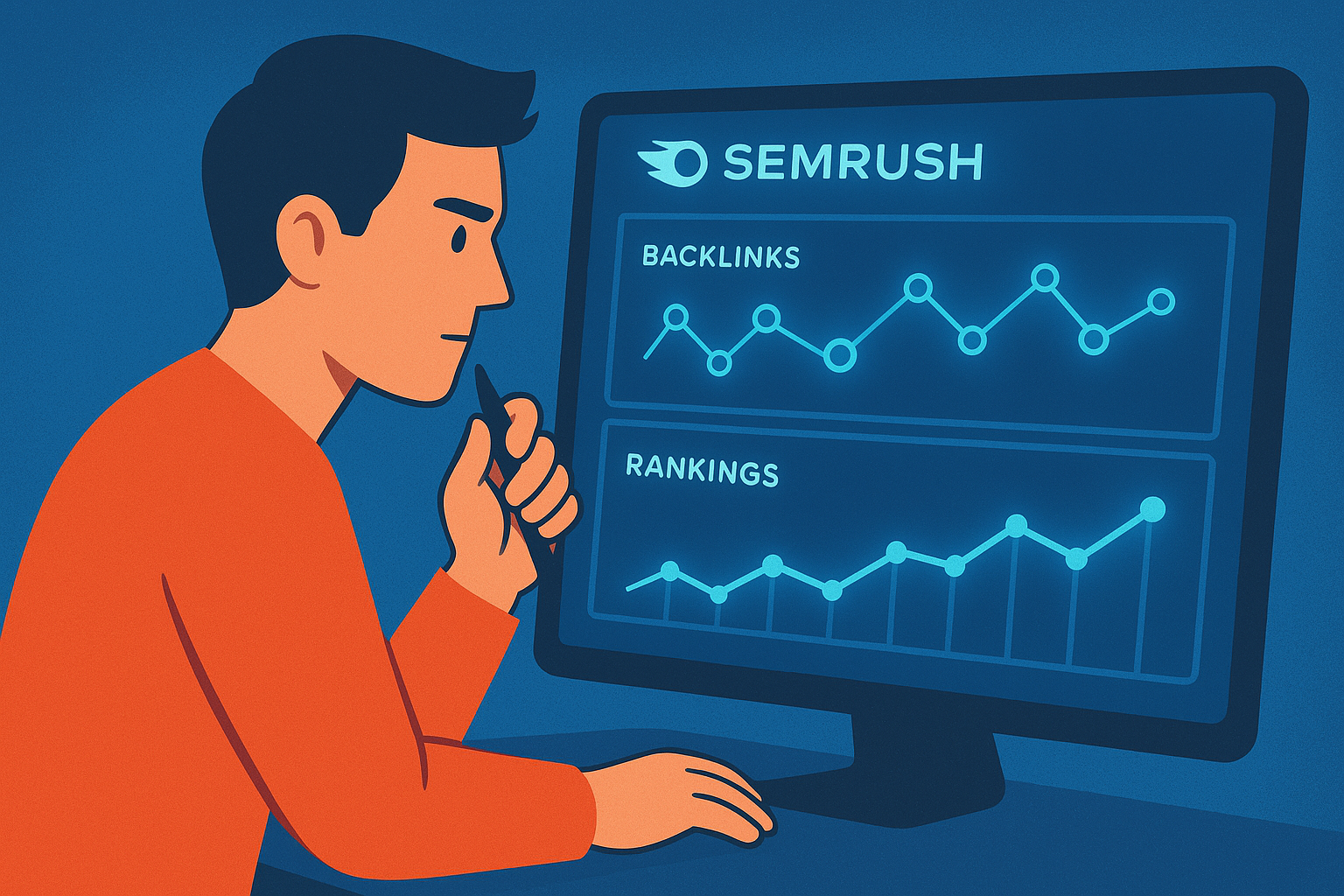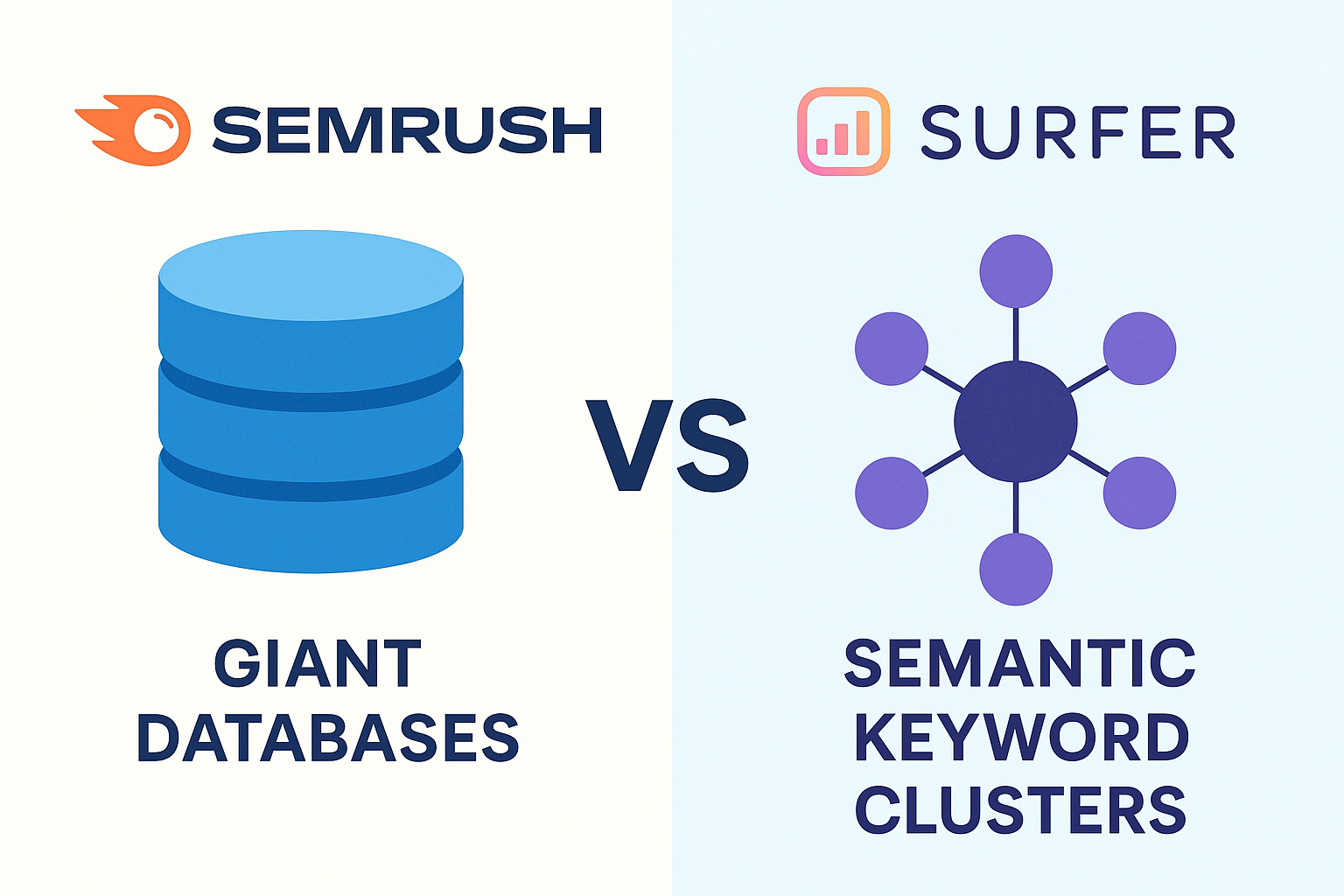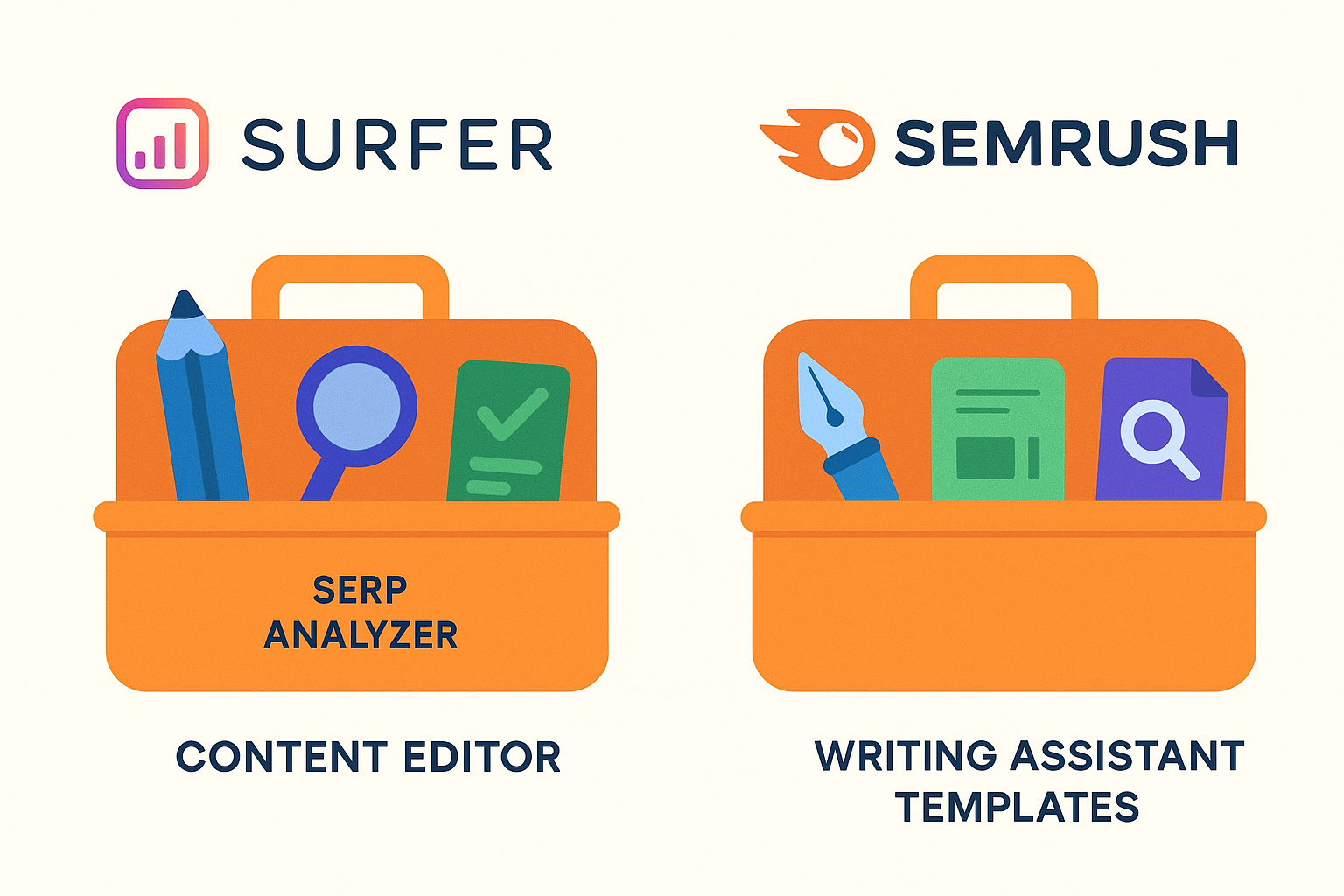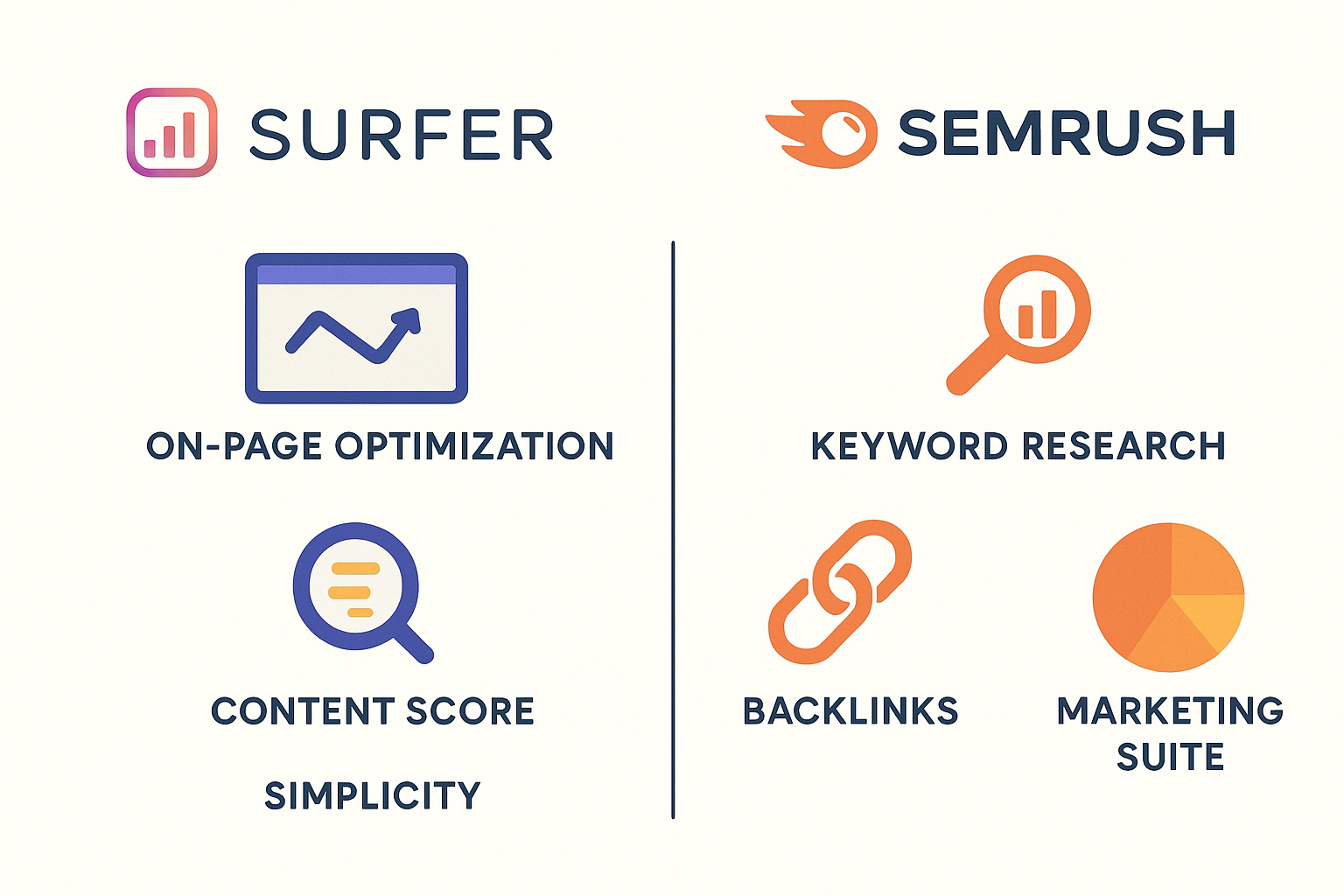Surfer SEO vs Semrush: Which Tool Delivers Better Results in 2025?

If you’ve spent more than a week in SEO, you already know no single tool does everything. And if someone tries to sell you on “the one SEO tool to rule them all,” run. Fast. Because SEO is messy, layered, and changing faster than TikTok trends.
That’s why Surfer SEO vs Semrush is such a spicy debate. These two aren’t even trying to be the same thing. Surfer SEO is laser-focused on on-page optimization and content.
Semrush? It’s the Swiss Army knife of digital marketing tools. One is a scalpel, the other is a full-blown operating room.
I’ve used both for years—across clients, personal projects, and training sessions—and I’ll tell you right now: which one you should choose depends less on the tool, and more on you.
(Side note: yes, sometimes the right move is to use both—but I’ll get to that later.)
So, let’s break this down in plain English. No fluff. Just the stuff you actually need to decide.
Keyword Research

Semrush
Semrush is the heavyweight here. Their Keyword Magic Tool is like a crystal ball for keyword research. Need long-tail opportunities? Competitive keyword gap analysis? Search volume, CPC, keyword difficulty, and intent all in one? Semrush has it.
I’ve used it to find content opportunities clients never even dreamed of—and yes, those turned into traffic and conversions.
Example: One client was stuck only targeting “fitness coaching” (super broad, super competitive). With Semrush, I found dozens of low-competition long-tails like “fitness coaching for new moms” and “online fitness coaching reviews.” Within weeks, those pages started pulling traffic.
Surfer SEO
Now, Surfer doesn’t even try to compete with Semrush’s keyword database. Instead, it’s playing a different game. Surfer looks at semantic clusters and gives you related terms and entities that Google actually associates with your topic. It’s like building content around the way Google thinks.
When I optimized a “pool cleaning” cluster with Surfer, its suggestions weren’t just random keywords—they aligned perfectly with what ended up ranking. Why? Because Google is smarter than stuffing in “pool cleaning” ten times. It wants context, related entities, and semantically connected topics.
👉 Takeaway: Semrush is for market-wide keyword research and competitive gap analysis. Surfer SEO shines when you’re actually sitting down to write or optimize a specific piece of content.
Explore Semrush’s Keyword Magic Tool | Check out Surfer SEO Keyword Research
Content Optimization (My Experience with Surfer)
This is where Surfer SEO earns its paycheck.
Surfer SEO

The Content Editor is honestly one of the best on-page SEO tools out there. It tells you:
I once had a client stuck at #11 (the SEO graveyard). After running the page through Surfer and making its suggested tweaks (keyword density, headings, a few semantically related terms), the page shot up to #3 within a month. That’s real ROI.
Semrush
Now, Semrush does have its SEO Writing Assistant. And it’s good—but in my experience, it feels more like a checklist. It’ll tell you about readability, tone of voice, and SEO basics. But it doesn’t feel as connected to the SERPs as Surfer does.
👉 Takeaway: If content is your main growth channel, Surfer SEO is a must. Semrush helps, but Surfer is like having a SERP coach whispering in your ear.
Try Surfer’s Content Editor | Explore Semrush SEO Writing Assistant
Content Editor
👉 Winner: Surfer SEO. Hands down.
Competitor Analysis
Here’s where Semrush runs laps around Surfer.

👉 Takeaway: If competitive intelligence is critical to your SEO strategy, Semrush wins.
Check Semrush Competitor Analysis Tools
Backlink Analysis
Links are still the backbone of SEO (sorry to those who say “links don’t matter anymore”—they do). And when it comes to backlinks:

Let’s not sugarcoat this: Semrush is the king of keyword research tools. Its expansive keyword database and filters let you slice and dice search intent, volume, CPC, and keyword difficulty like no other.
Surfer SEO does keyword research too, but it’s more about relevant keywords based on SERP analysis. It’s not for building a giant keyword map—it’s for fine-tuning individual content pieces.
👉 Takeaway: Semrush for big-picture keyword research. Surfer SEO for individual page optimization.
Digital Marketing
Here’s the elephant in the room. Semrush isn’t just an SEO tool—it’s a full-blown digital marketing suite.
- PPC campaign data
- Social media tracking
- Competitive ad analysis
- Market research
Surfer SEO? It’s SEO-only. And that’s fine! But if you’re running multi-channel campaigns, Surfer won’t cover your needs.
👉 Winner: Semrush for digital marketers. Surfer stays in its SEO lane.
Create Content
When it comes to the act of creating content:
👉 Side Note: I’ve onboarded non-SEO writers onto Surfer in minutes. They actually enjoyed using it. With Semrush? The learning curve is steeper.
Content Tools

Both are strong, but Surfer feels more tactical and immediate, while Semrush is broader and more strategic.
Content Score
Surfer’s Content Score is brilliant. Writers love it. Clients understand it. It gamifies SEO.
Semrush doesn’t really have an equivalent.
👉 Winner: Surfer SEO.
Local SEO
Semrush has solid local SEO tools—like local rankings, listings management, and competitor tracking. Surfer? Not really built for local.
👉 Winner: Semrush.
Learn about Semrush Local SEO
Surfer SEO vs Semrush : Key Features
Surfer SEO excels at:
Semrush excels at:

👉 Side Note: If you’re a solo blogger or content-first business, Surfer is enough. If you’re an agency or advanced SEO pro, Semrush is the one.
Pricing & Value
- Surfer SEO: Starts at $99/month. Great for bloggers, niche site owners, and small businesses.
Check Surfer Seo Pricing
- Semrush: Starts at $139/month. Pricey, but you’re paying for the full suite.
Check Semrush Pricing
👉 Honest advice? If your budget allows, use both. Build strategy in Semrush, then execute with Surfer.
FAQs
Q: Is Surfer SEO better than Semrush?
A: Not really—it depends on your needs. Surfer wins at content optimization, Semrush wins at everything else.
Q: Can I use both Surfer SEO and Semrush together?
A: Yes—and that’s actually the dream team. Semrush for strategy, Surfer for execution.
Q: Is Surfer SEO worth the money?
A: If content drives your traffic, absolutely yes. I’ve seen rankings move within weeks.
Q: Do I need Semrush if I already have Surfer?
A: If you’re running an agency, doing backlink campaigns, or need competitor analysis—yes.
Q: Which is better for beginners?
A: Surfer SEO. It’s easier, faster, and less overwhelming.
Final Thoughts
So, Surfer SEO vs Semrush—who wins?
At the end of the day, don’t pick a tool just because the internet says so. Pick based on your SEO strategy, your goals, and honestly, your budget. Because the best SEO tool is the one that actually gets you ranking.
Read more : Marketmuse vs Surfer SEO
